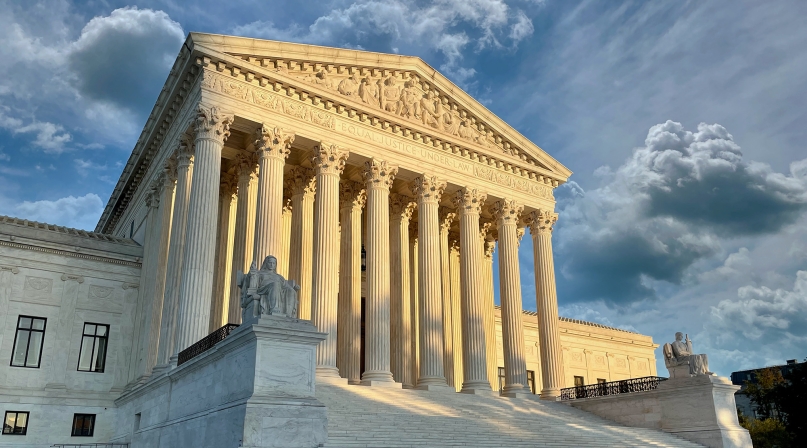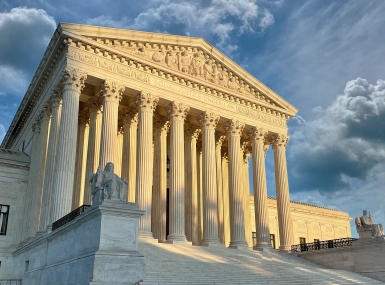NACo Legal Advocacy: Ames v. Ohio Department of Youth Services
Author

Paige Mellerio

Joe Jackson
Upcoming Events
Related News

County Nexus
As one of the largest employers in the country, counties have a significant interest in cases like Ames v. Ohio Department of Youth Services (Ames v. Ohio) that could expand county liabilities as employers. This specific case relates to Title VII discrimination lawsuits when claims of discrimination come from a member of a majority group. Title VII lawsuits are resource intensive and expensive to defend, and frivolous lawsuits could more easily be filed if the Sixth Circuit’s decision is reversed.
Background
Ames v. Ohio considers whether in addition to other elements of a federal Title VII discrimination claim, a petitioner arguing discrimination against a majority group must also show additional background circumstances to show that the respondent is the “unusual employer who discriminates against the majority.”
The case was brough on by Marlene Ames, a heterosexual woman working at the Ohio Department of Youth Services, who claims she was passed up for promotion and demoted to a previous position based on her sexual orientation since her supervisors and others making hiring decisions were LGBTQ. Ames was made Administrator of the Prison Rape Elimination Act (PREA). In 2017, Ames was assigned a new supervisor, Ginnie Trim, who was a gay woman. Trim reported to her supervisor that Ames “met expectations” in her role as administrator. In 2019, Ohio’s governor appointed a heterosexual man to be the department’s director. At the same time, Ames applied to be the department’s Bureau Chief of Quality by a gay woman was hired instead. Afterwards, Ames was demoted to her previous position, resulting in a significant reduction in pay, and the Administrator of PREA position was filled by a gay man.
Ames filed a discrimination case claiming she was discriminated against based on her sexual orientation. The Sixth Circuit found that she met the typical requirements for a Title VII discrimination case by establishing a pattern of discrimination but also stated that because Ames is a member of a majority group, she must show additional circumstances that indicate her employer is the “unusual employer” who discriminates against the majority group. The Sixth Circuit ultimately ruled in the Department’s favor believing that Ames did not meet this additional standard. Afterwards, Ames petitioned the Supreme Court and on October 4, 2024, the Court agreed to hear the case, with oral arguments being scheduled for February 26.
NACo Advocacy
In a Local Government Legal Center Brief, filed in support of the respondent, NACo urges the Supreme Court to uphold the Sixth Circuit’s decision to avoid weakening antidiscrimination law to not allow increased frequency of frivolous lawsuits and shift undue burden onto the employer.
Current Status
Oral arguments are scheduled for February 26, 2025.
2024-2025 Supreme Court Term

NACo Legal Advocacy: Ames v. Ohio Department of Youth Services
As one of the largest employers in the country, counties have a significant interest in cases like Ames v. Ohio Department of Youth Services (Ames v. Ohio) that could expand county liabilities as employers.

NACo Legal Advocacy: City of Seattle et al. v. Kia/Hyundai
The question at hand in City of Seattle et al. v. Kia/Hyundai is whether or not the Federal Motor Vehicle Safety Standard preempts state tort claims brought forth by local governments alleging that Kia and Hyundai’s failure to install “reasonable” anti-theft technology constitutes negligence and public nuisance.

NACo Legal Advocacy: Perttu v. Richards
Perttu v. Richards has implications on the Prison Litigation Reform Act (PLRA) and could increase the amount of Section 1983 inmate-initiated cases against county jails that reach federal court, ultimately resulting in counties having to expend resources on frivolous lawsuits.

NACo Legal Advocacy: McLaughlin Chiropractic Associates, Inc. V. McKesson Corporation
McLaughlin Chiropractic Associates, Inc. V. McKesson Corporation could make it more difficult for counties to challenge FCC orders, many of which have taken steps to preempt and curtail local authority by limiting counties’ abilities to manage their own right of way and assess fair market value permitting and impact fees on providers seeking to construct, modify or extend telecommunications infrastructure in their communities.

NACo Legal Advocacy: San Francisco v. Environmental Protection Agency (EPA)
San Francisco v. Environmental Protection Agency (EPA) has implications for the ability of county governments that own and operate wastewater treatment facilities to comply with National Pollutant Discharge Elimination System (NPDES) permit requirements.

NACo Legal Advocacy: Lackey v. Stinnie
Lackey v. Stinnie will impact the ability of state and local governments to avoid paying litigation fees in a civil rights case if they change their conduct (i.e. repeal a law) after a court has granted a preliminary injunction.

NACo Legal Advocacy: Bondi v. VanDerStok
Garland v. VanDerStok has implications for the ability of county law enforcement to uphold public safety and investigate crimes involving ghost guns.

NACo Legal Advocacy: Stanley v. City of Sanford
Stanley v. City of Sanford will impact the ability of county governments to balance budgets by reducing or eliminating post-employment benefits for disability retirees.

NACo Legal Advocacy: EMD Sales, Inc. v. Carrera
EMD Sales, Inc. v. Carrera could make it more difficult for county governments to prove exemptions under the Fair Labor Standards Act (FLSA), which would increase the potential for costly litigation.

NACo Legal Advocacy: Federal Communications Commission, et al v. Consumers' Research, et al
Federal Communications Commission, et al v. Consumers’ Research, et al. (FCC v. Consumers’ Research) could jeopardize what is known as the Universal Service Fund (USF). Through the USF, the FCC has provided billions of dollars to local governments and our residents, helping provide essential telecommunications and broadband services to unserved and underserved communities. FCC v. Consumers’ Research challenges the FCC’s legal authority behind the USF, putting multiple programs essential to equitable broadband deployment at risk.
Advocacy
NACo Legal Advocacy: Perttu v. Richards
Perttu v. Richards has implications on the Prison Litigation Reform Act (PLRA) and could increase the amount of Section 1983 inmate-initiated cases against county jails that reach federal court, ultimately resulting in counties having to expend resources on frivolous lawsuits.
